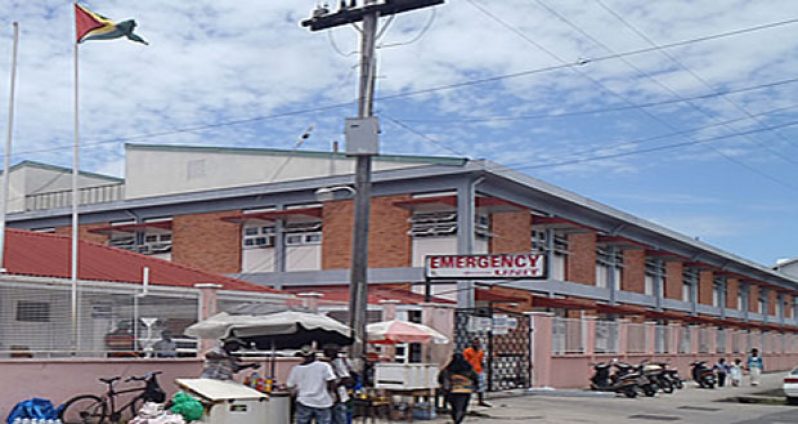The relatives of a premature born baby who died on Tuesday at the Georgetown Public Hospital Complex, are claiming that the baby’s death is as a result of a blood transfusion that was given to him even as the parents did not give permission for same. According to the baby’s grandmother Lucette Timmerman, the baby was born at the Linden Hospital Complex at 28 weeks on the 16th January and was transferred the GPHC in a stable condition and breathing independently on the 17th January. She said that the hospital made a decision to transfer the baby since LHC does not have the equipment and resources to provide pre term care.
Since his mother was not discharged from LHC she initially took care of her grandson and noted that day by day he was progressing and was increasing in weight. “He was breathing on his own and everything. Every morning the baby would go and see doctor and the doctor would say just keep increasing the breast milk to feed baby,” she related. She alleged that the baby was in the care of Doctor Singh and Hinds (only names given) but one afternoon he was seen by some new doctors, who told his mother Latoya Winfield that the baby needs a blood transfusion.
“My daughter came and told me that some new doctors look baby and that baby look pale and baby want blood and so they will give baby blood but the afternoon when she went back baby wasn’t given blood, but the next day when she went back she said they gave baby blood and by afternoon when she went back baby was critical, baby bleeding from his brain, baby belly swollen, blood start running out through baby mouth,” she related to this publication.
She said she immediately visited the Intensive Care Unit at the hospital and the baby; at the time he was in a terrible state. “When I go to the ICU I see they had a tube in baby mouth and the blood just gushing out from the tube.” She said that the entire procedure seems amidst since the transfusion was not given in the presence of the parents or family member and immediately after, the baby’s condition went from stable and improving to critical which resulted in his death. When she asked how much blood the baby received she said the doctors related ‘only two lil syringe.’
When the baby died around 4 PM, the relatives were then told that the baby’s blood count was low but this seemed strange since all along they were reporting to them that “the baby is doing fine.” Lucette claims that the family is not getting enough answers from the hospital and needs closure on this issue. “Yes that is what we trying to find out but they covering up. Dr. Singh and Dr. Hinds was baby regular doctor and we are trying to find out who is this new doctor that ordered the blood but they trying to cover up. Dr. Singh just saying that the baby need blood so I said why is it that you never said baby want blood and since this woman come on this shift she said baby want blood. Them aint ask the mother consent nothing but they just choose to give baby blood,” Lucette argued.
When the Guyana Chronicle contacted GPHC for a comment, Public Relations Officer Ms Miczi Campbelle said that the hospital at the time cannot comment on the matter since the consultant was not in possession of the baby’s chart. She said that information will be made available at a later date.
According to the Canadian Pediatric Society, premature babies are often born with anaemia (a low blood count) and 90% of these are transfused. “More than 90% of extremely low birth weight infants are transfused, and they receive an estimated average of five transfusions each. “Premature babies are often anaemic.
This means that they do not have enough red blood cells. Normally, the foetus stores iron during the latter months of pregnancy and use it after birth to make red blood cells. Infants born too soon may not have had enough time to store iron,” the society stated in an article featuring blood transfusion in preterm babies. It also posited that transfusion is done only after reasonable efforts have been made to provide a larger initial blood volume.
These include treatment with dietary iron supplements, drugs that increase red blood cell production and increased feeding on breast milk since it provides all the nutrients needed. If all of this is done and the baby continues to suffer from anaemia then a blood transfusion may be done. If this is the case however, there are specific considerations for blood-banking procedures. “New-borns, particularly extremely low birth weight infants who are most exposed to transfusion, are already immunologically compromised and neurodevelopmentally vulnerable, all transfusion-transmitted infections put the new-born at risk.”




.png)









